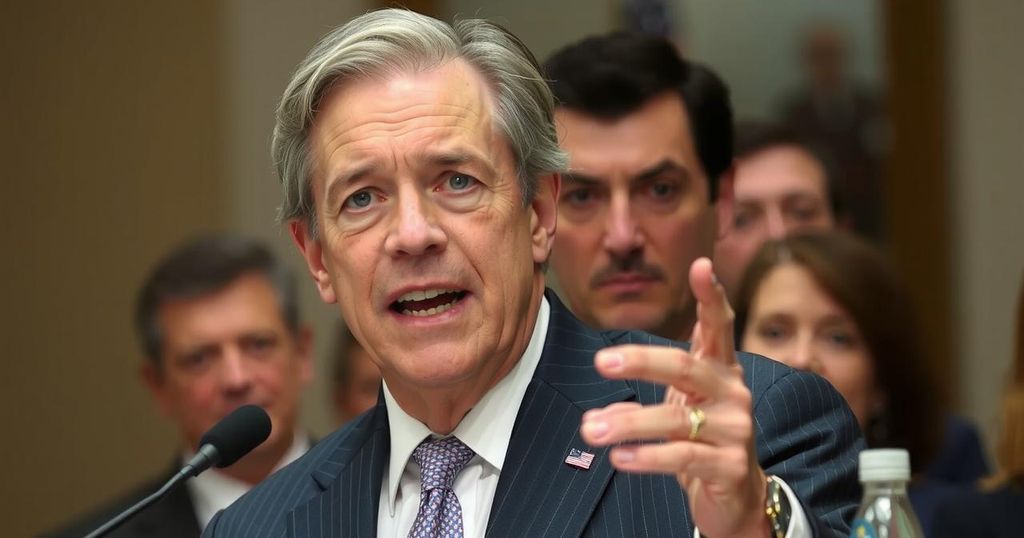World news
” MCCAUL, AFGHANISTAN, AMERICA, AP, ASIA, BIDEN, BLINKEN, CONGRESS, DEMOCRATIC NATIONAL CONVENTION, ELECTION, FAR, HOUSE FOREIGN AFFAIRS COMMITTEE, HOUSE REPUBLICANS, JOE BIDEN, PRESIDENTIAL CAMPAIGN, PRESIDENTIAL DEBATE, TALIBAN, TEXAS, U. S, U.S. ELECTIONS, U.S. PRESIDENCY
David O'Sullivan
0 Comments
Blinken Defends Afghanistan Withdrawal Despite Criticism from GOP Lawmakers
Secretary of State Antony Blinken testified before Congress regarding the U.S. withdrawal from Afghanistan, facing criticism from Republican lawmakers who labeled it a significant failure of the Biden administration’s foreign policy. While McCaul called the withdrawal “catastrophic,” Blinken defended the administration’s actions, attributing challenges to a deal made by the previous Trump administration. The testimony follows a Republican report accusing the Biden administration of mishandling the exit, as concerns about the humanitarian impact and safety of individuals left behind continue to haunt policymakers.
During a recent session with the House Foreign Affairs Committee, U.S. Secretary of State Antony Blinken faced significant scrutiny concerning the withdrawal of U.S. forces from Afghanistan. This moment has been termed by some Republican lawmakers as a pivotal failure of the Biden administration’s foreign policy. Representative Mike McCaul characterized the event as a disaster that ignited turmoil worldwide and urged Blinken to acknowledge the severe repercussions of the withdrawal. In his defense, Blinken emphasized the influence of a prior agreement negotiated by former President Trump with the Taliban, arguing that the Biden administration had no feasible options but to comply with that agreement to prevent escalating violence.
Blinken commenced his testimony with heartfelt condolences to families of service members who lost their lives during the withdrawal, though his remarks were frequently disrupted by concerned advocates in the audience. He reiterated that the choice facing President Biden was stark: to either disengage from the conflict or escalate the U.S. military presence, potentially reigniting assaults on American troops and allies.
This testimony is particularly significant as it follows the release of a Republican report assessing the chaotic conclusion of the U.S. involvement in Afghanistan, which squarely placed the blame on the Biden administration while minimizing the implications of Trump’s prior actions. The inquiry scrutinized the timeframe leading to the Taliban’s rapid takeover and the resulting humanitarian crises, which left numerous individuals vulnerable after the U.S. departed. Past assessments reveal that failures permeated several administrations, implicating both President Biden and former President Trump in the fallout of this controversial withdrawal.
The U.S. withdrawal from Afghanistan, completed on August 30, 2021, marked the end of a protracted conflict that began in 2001. The decision to withdraw was predicated on a February 2020 agreement between the Trump administration and the Taliban, which set the stage for a rapid exit of American forces. Critics argue that the execution of this withdrawal was chaotically handled by the Biden administration, leading to unprecedented challenges, including leaving behind American citizens and Afghan allies at risk. This event has sparked extensive congressional hearings and investigations, delving into accountability and strategy across both the Trump and Biden administrations, with contrasting perspectives on the root causes of the withdrawal’s failures.
In conclusion, Secretary of State Antony Blinken’s recent testimony underscored the contentious nature of the U.S. withdrawal from Afghanistan, positioning it as a significant and controversial chapter in American foreign policy. With strong critiques levied from GOP representatives, the discussion highlights the complexities of decision-making in foreign interventions and underscores the shared responsibility of both the Trump and Biden administrations in the outcomes of America’s prolonged engagement in Afghanistan. This episode continues to provoke debate regarding accountability and the efficacy of U.S. foreign policy strategies.
Original Source: www.news-herald.com




Post Comment